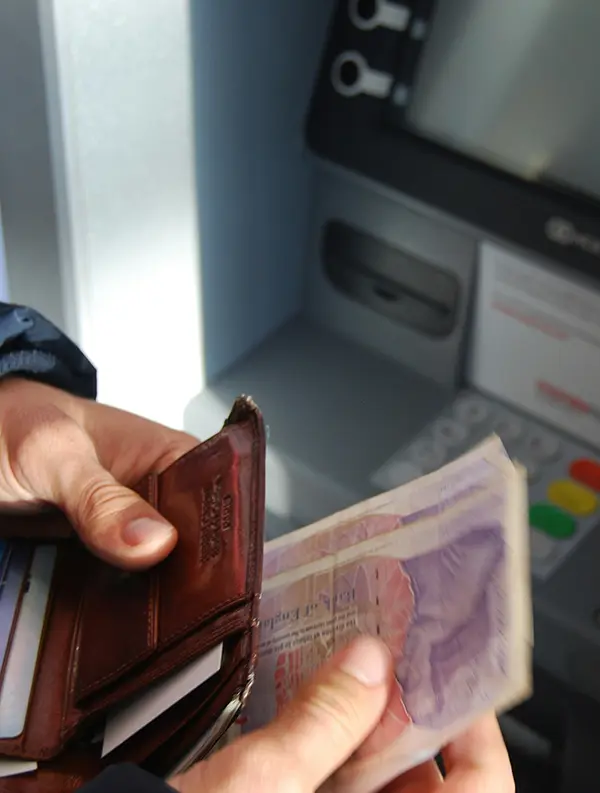Cash has been around in one form or another for well over a thousand years. Many people have predicted and plotted cashless societies for decades – but cash just refuses to go away.
Across Europe, cash use either remains strong or is even growing. In the UK where cards are regularly cited as the most popular payment method, cash use is staging an astonishing comeback. Nationwide revealed a 28% increase in cash withdrawals from its ATMs since the pandemic and over 31 million cash withdrawals were made from them in the last year.
There are many different reasons why the payments pendulum is swinging back to physical cash. Pressure on family budgets due to the cost-of-living crisis and concerns about personal privacy are just a couple of popular theories.
This may come as a surprise for companies who currently accept cash and a shock for those who were hoping it will just go away.
Some are turning to CashTech to help make its management more efficient, secure and data driven.
Let’s take a closer look at CashTech, where it came from and what it is.
What is CashTech?
Combining the words ‘cash’ and ‘technology’, CashTech refers to the technological advancements surrounding physical cash.
There are two main components of CashTech.
Firstly, there are smart hardware solutions. Secondly, cutting-edge software that improves cash management efficiency. This adds important new data insights into the mix that can improve cash management within your business.
Combined together, CashTech elevates physical cash management and automation to a new level, giving you a complete overview of your cash estate, that can:
- Reduce cash discrepancies
- Eliminate inefficiencies
- Create valuable real-time data
For consumers wanting to opt out of corporate data gathering, CashTech offers total privacy when making a purchase while offering a slick and efficient payment experience. Instead, cash acceptance allows organisations to learn about consumers’ behaviour and spending habits through personal interactions. In addition, data security concerns associated with card payments such as fraud and cybersecurity attacks are eliminated.
What is FinTech?
You may already be aware of the term FinTech. It has been used over the last decade to describe companies that are using new technology to make electronic payments and financial services faster, cheaper and more competitive.
FinTech quickly gained traction following the global financial crisis (2007-2008) and changes to banking regulations. It has revolutionised the slow and expensive financial services sector that was based on legacy bank technology.
Although FinTech has revolutionised financial services and how we make payments, it has neglected physical cash payments.
CashTech and FinTech solve very similar core problems. It is just one of many subsets of FinTech, alongside RegTech and InsurTech. Both use new technology to digitise and replace outdated legacy systems. They both achieve greater efficiency and speed while leveraging data for insights and better decision-making.

Key Features of CashTech
CashTech is not only about deploying hardware with the latest security and efficiency features. It also adds new data capabilities that have previously only been available with electronic payments.
Prior to implementing CashTech into your business operations, it’s important to evaluate and assess your internal processes and workflows around physical cash. It is the first step towards increasing efficiency, reducing labour costs related to cash management, and improving your bottom-line.
The key features are outlined below.
Open API Integration
Incorporating smart software into financial systems allows you to access open APIs and adapters. These enable software to communicate and interoperate with other systems within your wider financial ecosystem.
This software is revolutionising physical cash processes. It provides instant visibility across your whole cash estate whilst integrating with existing accounting software packages to provide total cash visibility.
Connectivity
Modern CashTech services, such as PayComplete’s Configure Connect, enables your business to communicate over 4G networks with other transaction devices within your fleet. This offers the ability to amalgamate financial information across locations and branches.
Whether your business serves the hospitality, transportation, or retail sector, 4G connectivity is available ‘everywhere and anywhere’, despite cash payments being a physical entity.
Fraud Monitoring & Detection
Embedding CashTech solutions into your business will simplify your risk management processes. Transactions can be simultaneously monitored across a number of devices, to look for any signs of fraud in real-time. The enhanced security features that CashTech offers solves the common perception that physical cash is ‘dirty’, easily stolen, laundered, and costly to process.
Instead, cash transactions can be monitored and checked with a level of sophistication and accuracy which was previously impossible with cash handling.
Reducing the number of people physically touching cash is also a sure way to reduce the opportunity for fraud.
Account for Every Penny
CashTech allows you to account for every penny, and every pound.
It enables you to accurately monitor cash flow within your organisation in real-time, which is a huge benefit for your Finance team.
Modern communications technology also means you can remotely manage your transactional systems, including anything from provisioning, configuration, software updates, and troubleshooting.

Why is CashTech Important?
Companies are constantly looking for ways to improve the efficiency of their operations and reduce costs.
As demand for physical cash by consumers rises, so will organisationally focus on its management and efficiency.
Even though some companies may consider going fully cashless, new research by PayComplete reveals that 56% of organisations do not foresee themselves ever going fully cashless.
That means CashTech solutions are more important than ever.
But why exactly is that?
Consumer Choice & Inclusion
As well as focusing on efficiency, organisations are also looking to deliver higher levels of customer satisfaction.
But post-pandemic research revealed that 5 in 10 businesses using Square are now cashless.
This trend is reflected in consumers’ spending habits. Global cashless payments are set to increase by more than 80%, from 1 trillion transactions to almost 1.9 trillion.
But cash. This means the need for widespread cash acceptance is essential, especially to those in vulnerable groups or with limited access to digital payment methods, such as the elderly or homeless.
So, although card payments are undeniably popular, removing the option to pay with cash clearly limits customer choice, harming customer satisfaction.
They shouldn’t be pressured to make a cashless payment, simply because that’s how you want them to pay.
Offering customers the ability to pay in cash is important in maintaining financial inclusion and upholding consumer choice.
Cost-of-Living Crisis
The convergence of social, economic and political factors globally has resulted in energy and food prices skyrocket over the past year or so. The current cost of living crisis has caused a consumer shift towards physical cash to help manage personal spending and household budgets.
When conducting our latest piece of research, we found that 34% preferred using cash to manage their spending.
This level of control and accountability looks set to drive more consumers back to cash in coming months and years.
Business Landscape
Small and medium-sized enterprises (SMEs) make up a significant portion of the business landscape worldwide.
SMEs heavily rely on cash transactions, with 77% of their transactions being conducted in cash.
An additional 50% of small businesses stated that cash is their primary payment method over digital payments.
Incorporating CashTech solutions and devices allows both SMEs and larger corporations to harmoniously accept all kinds of payments – whether that be cash, card, or contactless – whilst streamlining physical cash management processes.
Real omnichannel payments
Businesses are eager to offer an omnichannel payment experience across both online and in-store environments, but they frequently ignore the existence of cash in their strategy.
With the continuing rise in the use of cash, a payment strategy cannot legitimately be omnichannel if it doesn’t allow customers to pay with cash. Not recognising this fact will mean organisations will subject their customers to an erratic user experience and potential loss of sales.
Security Concerns
In recent years, payment-related data has become increasingly important in shaping business strategies and how they improve customer experiences.
But not all customers like this extreme level of personalisation.
PayComplete’s latest research indicates that 84% of those surveyed had concerns about businesses collecting their data from card payments. With this in mind, 81% choose to use cash to minimise data shared.
Offering consumers the opportunity to make a transaction using cash helps to mitigate security concerns, whilst simultaneously allowing you to still learn about their shopping habits and behaviours when using a CashTech solution.
Loyalty Offerings
As CashTech provides anonymous insights into customers’ spending habits and behaviours, there is the opportunity to introduce different types of loyalty schemes and promotions for physical cash acceptance.
What are the Uses of CashTech?
CashTech can benefit businesses across sectors that accept cash payments, especially retailers and those in the hospitality industry where cash processing, from handling to sorting and reporting, is commonplace.
Cash Handling
Cash handling is the process of giving and receiving money within your business. It ranges from:
- Physical cash management – How cash is received and distributed, where it is stored, and who has access to it.
- Point-of-sale systems – Those conducting the transaction must be properly trained and have control over the cash register.
- Payment tracking – Whether the payment is physical or digital, it needs to be tracked, monitored, and properly stored.
- Paper trail – Receipts, invoices, and any other payment documentation must be processed and filed correctly.
PayComplete’s latest research found that cash handling remains an entirely manual process for a staggering 41% of respondents.
The manual handling of cash can cause cash discrepancies such as errors in counting, mismanagement of funds, or even theft.
Without proper processes, you may encounter problems with bookkeeping, fraud, theft, and cash flow. Knowing where your money is and who has access to it, is crucial at all times.
Automating cash handling with smart tools like recyclers and smart safes, as well as automats and self-service kiosks, can help eliminate these risks.
Security risks also pose a threat to those who manually deal with cash. In instances where six or more people touch cash, PayComplete’s research found that security spend within a business increases by over 380%.
Cash In-Transit & Storage
The global cash in-transit market was valued at nearly USD 24.69 billion in 2023 and is anticipated to grow to an astonishing USD 49.63 billion by 2032. The rise in demand demonstrates how essential the service is in keeping cash moving.
The movement and storage of cash is most likely to be from an organisation’s physical location (like a restaurant or shop location) to their bank.
Cash in-transit is arguably one of the most high-risk stages of the cash journey, with cash in-transits heists up by 19% and becoming increasingly more violent.
Despite its risk exposure, many companies manage the process internally. PayComplete’s research unveiled that 46% of businesses rely on employees to move cash to their chosen bank, putting the welfare and safety of staff on the line as well as making the cash far more vulnerable to theft.
Installing devices, such as a smart safe, alongside transportation vehicles, is the answer.
Combining computer technology with secure metal hardware helps to physically protect cash whilst validating its value and authenticity.
Real-time cloud data can provide operators with greater visibility of cash stores and faster access to working capital. It can facilitate your access to cash data from anywhere, allow for the investigation of cash shrinkage, and enables instant credit with banks. It provides immediate access to cash revenue; as opposed to having to wait until it’s banked, which allows for business to make financial decisions more swiftly.
Cash Counting & Sorting
Cash counting machines can be traced all the way back to China in the 1950s, making it one of the earliest cash handling processes to become automated.
The biggest challenge for those still manually handling and processing cash is the discrepancies that occur. In organisations where 3-5 people manually handle cash, a shocking 20% of its value is lost each year.
Today, it can be automated through a number of technologies such as currency counters, detectors, and automatic teller machines (ATMs).
Thanks to the many cash counting and sorting devices, only 22% of organisations surveyed by PayComplete have entirely manual processes. But it had the highest level of partial automation for cash-related tasks at 61%.
Legacy mechanical technology does not offer the same level of intelligence that innovative CashTech solutions provide, explaining why many institutions still opt for partial automation.
Cash Reporting
Financial reporting gives you an oversight of your business’ funds, where the revenue is coming from, and where it is being spent – across all your locations.
Organisations would like the kind of accuracy and insights relating to cash management reporting that are commonplace for many forms of electronic payments. But still, less than a third of organisations surveyed by PayComplete have a fully automated cash reporting process in place.
A low level of automation is likely to indicate inefficient processes with higher costs, as well as a greater chance of human error.
CashTech opens the door for more accurate reporting of cash transactions within businesses and reduction in human error leading to lost revenue.


The Benefits of CashTech
CashTech is a must-have addition for organisations handling large quantities of cash as well as those operating in multiple branches, across multiple regions. Implementing it into their physical cash infrastructure offers a range of benefits.
Customer Satisfaction
CashTech supports the primary aim of many organisations – improving customer satisfaction.
This is becoming increasingly important as consumers around the globe demanding financial freedom.
In Australia alone, 99.7% of 15,000 participants stated that they wanted to retain the ability to pay in cash, CashTech enables you to manage cash payments in a more cost-effective manner, with increased efficiency.
Improved efficiency
CashTech solutions combine smart hardware and software to improve efficiencies within businesses.
This is achieved by reducing the number of people physically touching the money through automation such as currency counters, cash recyclers, and smart safes as well as removing points of vulnerability to reduce currency losses.
Increased Security
Risk exposure is drastically reduced by automation which delivers improvements in two key areas. Firstly, there are cost efficiency benefits as companies can scale back their security and employee headcount budgets.
Secondly, automation increases the overall security of the cash journey through the business, there is less room for manual error.
Data & Reporting
One of the most important benefits of CashTech is its ability to digitise the cash management process thereby creating invaluable real-time data. Companies will be able to access this real-time data for precise reporting and better oversight of their cash processes and business health.
This enables you to monitor and optimise your finances in real-time and view transactions across different branches, around the globe.
Cash Orchestration & Reconciliation
An essential but often overlooked aspect of cash management is cash reconciliation and orchestration.
These processes ensure that all cash transactions are accurately tracked, matched, and reported across an organisation’s financial systems, reducing errors, and enhancing operational efficiency.
Cash Orchestration
Cash orchestration refers to the seamless coordination of cash movement across various locations, devices, and banking partners.
It involves integrating multiple cash handling touchpoints, such as point-of-sale terminals, ATMs, smart safes, and cash recyclers, into a unified system. This allows businesses to monitor their cash flow in real time, ensuring that cash is allocated where it’s needed most while minimising idle funds.
With advanced CashTech solutions, businesses can automate the orchestration of cash across their entire network, reducing the need for manual intervention.
By leveraging real-time analytics, organisations can optimise cash distribution, predict demand, and ensure operational liquidity, without unnecessary stockpiling.
Cash Reconciliation
Cash reconciliation is the process of verifying cash balances across different financial records, ensuring that recorded transactions that align with actual cash holdings. This process is crucial for identifying discrepancies, preventing fraud, and maintaining accurate financial reporting.
Traditional cash reconciliation methods are time-consuming and prone to human error. However, CashTech solutions provide automated reconciliation features that cross-check transaction records with physical cash counts in real-time.
By integrating with existing accounting and enterprise resource planning systems (ERP), businesses can streamline the reconciliation process and reduce errors caused by manual data entry.
By incorporating cash orchestration and reconciliation into their operations businesses can achieve higher efficiency, lower costs, and advanced financial control – further solidifying CashTech’s role in modern cash management.
The Future of CashTech
The continuing popularity of cash and the growing awareness of CashTech is causing organisations to re-evaluate their payment strategy. Businesses are seeing CashTech as an opportunity to not only breathe new life and efficiency into ageing internal systems, but to better serve their customers.
It will change the way cash is processed, modernising how physical cash payments are made and received, integrating physical cash, card payments, and other alternative payment methods into a single end-to-end solution.
CashTech is a route to implementing a fully omnichannel payments strategy. It is unlocking a whole new value proposition from payments – just like FinTech did for the electronic payments industry 10 years ago.
PayComplete CashTech Solutions
PayComplete is the global leader in CashTech solutions. We combine smart hardware with best-in-class software to unify the processing of cash with other payment methods and operational systems.
Dedicated to improving experiences and operations for both customers and businesses, the PayComplete solution amalgamates the management of transactions, users, devices, and data to bring digital precision to cash payments and systems.



